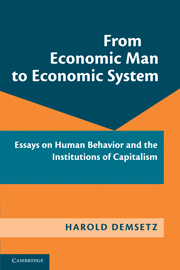4 - ECONOMIC MAN'S ESCAPE FROM MALTHUS'S POPULATION TRAP
Published online by Cambridge University Press: 22 July 2009
Summary
The pursuit of one's narrowly defined self-interest may sometimes come at the expense of the group to which one belongs. It is easy to give examples of this. A person in possesion of important military secrets finds it in his or her interest to offer them for sale to an enemy nation, putting his or her own country into jeopardy; at the other extreme, a person, too lazy to look for a trash can, tosses gum wrappers onto a public sidewalk. Between these two examples is the driver who enters a freeway without concern for the added congestion this causes others. These examples illustrate that Adam Smith's most important insight might not always hold under some circumstances. This insight – the invisible hand that transforms private actions into social benefits – would seem to require a set of constraints whose effects are to put private actions to the service of the larger public, and, in Smith's defense, he discovers the invisible hand in the context of the constraints imposed by the legal arrangements that underlie a market-based economy. These discourage theft and disregard for the property of others. The world being as it is, strict conditions of ownership and contract cannot be satisfied perfectly, and, so, situtions do arise in which private interests may fail to serve the interests of others in the group to which one belongs.
- Type
- Chapter
- Information
- From Economic Man to Economic SystemEssays on Human Behavior and the Institutions of Capitalism, pp. 51 - 62Publisher: Cambridge University PressPrint publication year: 2008



